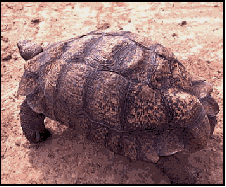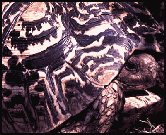|
The Leopard tortoise is a large and attractively marked tortoise which has a wide distribution in sub-Saharan Africa, including recorded localities in southern Sudan, Ethiopia, Eastern Africa (including Natal), Zambia, Botswana, Namibia, Angola and Southwest Africa. In this species males may attain a greater size than females, a characteristic shared with certain other members of the genus Geochelone, including Galapagos tortoises. Large examples may be 60 cm (over 2 feet) long and weigh over 35 kg (about 80 lbs.).
This tortoise favours semi-arid, thorny to grassland habitats. It is, however, also found in some regions featuring a higher level of precipitation. Not surprisingly, given its propensity for grassland habitats it grazes, extensively upon mixed grasses. It also favours the fruit and pads of the prickly pear (Opuntia sp.), succulents and thistles. It captivity it is a common error to feed too much 'wet' food such as lettuce, tomatoes and fruit; in reality this tortoise requires a coarse, high fibre diet. Feeding excessive fruit or 'soft' foods frequently leads to repeated flagellate and other gut problems such as colic, most probably as a result of increased gut motility. Leopard tortoises will graze happily on lawn grass if presented with the opportunity and this seems to prevent most such problems at source. Meat products should never be given to Leopard tortoises. They invariably lead to excessive growth, poor bone formation, dangerously high blood-urea levels, bladder 'stones' and liver problems. Due to their prodigious rate of growth, their demand for calcium and mineral trace elements is high. A calcium-D3 supplement should be provided daily.
Further details on keeping & breeding
Leopard tortoises are available
from the Tortoise Trust.
|
|




